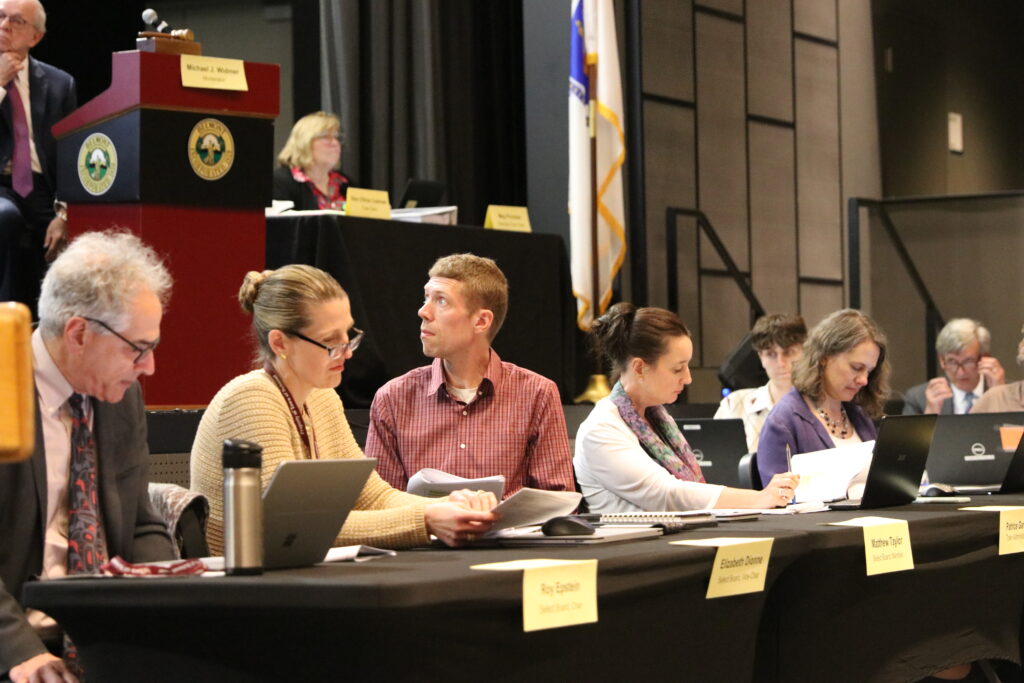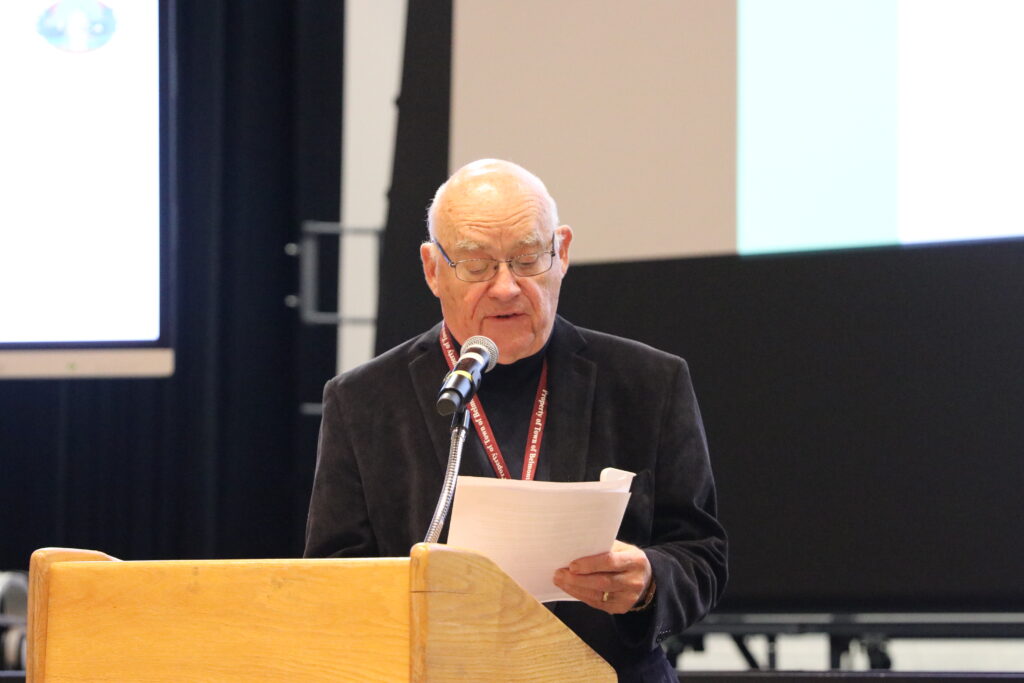Photo: Belmont Town Meeting, 2024
One member described the opening night of the 2024 edition of Belmont’s annual Town Meeting on Monday, April 29, as “a bit of a snooze.”
That observation was pretty close as the three articles were like reading the small print on the back of a life insurance statement: important, no doubt, but unlikely to raise passions as articles have done in previous years.
However, for those leading the reformation of the town’s Zoning Bylaws, this first night was not a series of housekeeping tasks in copy editing and revamping the town’s zoning code. Rather, Monday was akin to a musical overture, hinting at major themes and motifs that future assemblies of the town’s legislative body will take on for the next decade.

“This meeting is critically important because Town Meeting has to be part of the process of change,” said Select Board’s Elizabeth Dionne, who initiated and is leading the overhaul of the code. “And we do it through these incremental changes while we prepare to do the big overhaul,” said Dionne, who declared Belmont’s current zoning bylaws “a hot mess.”
“It’s going to take many, many votes over the next several Town Meetings to get ourselves into the place where we have thriving commercial districts and places where everybody can [prosper],” said Rachel Heller, Precinct 3, who was co-chair of the MBTA Communities Task Force, which recently handed its recommendations to the Planning Board that will come before a Special Town Meeting for a vote in November.
The Meeting
After a dower presentation from Mark Haley of the Municipal Rink Building Committee and the presentation of the results of a poll on adopting hybrid participation for future Town Meetings, the meeting proceeded to essentially two articles, number 5 and 6, that allowed a scrubbing of portions of the zoning code.
Members were asked to accept changes to the bylaws to clarify language, change word placement for better readability, and correct ” scrivener errors in citations.” It wasn’t surprising that the Planning Board’s Jeffrey Birenbaum sarcastically noted that the articles were to be “very exciting” for members.
While seemingly voting for members was fairly routine, Bob McGaw, Precinct 1, who has taken the unofficial role of the Town Meeting’s copy editor, presented amendments to correct the articles’ words and phrasing.
“Tedious wording, so bare with me,” said McGaw, to laughter. However, his work is important as he amends the articles to clarify and remove future unattended consequences that could be costly, such as repairing confusing language or even possible litigation.

“I just want to make [the article] clear in its intent,” said McGaw. “People have to know that we are making laws. This isn’t voting for flowers on Mother’s Day. It’s important.”
Each article passed by a margin of better than 225 votes of nearly 240 cast.
Parking Love
The final article of the evening likely brought most members to the High School auditorium, which would grant restaurants – both current and whoever is coming down the road – a more significant number of seating by allowing the eateries to count four times the number of parking spaces in the licensing process.
The article reduces restaurant parking requirements from one space per two-person seating capacity to one space per four-person seating capacity. Restaurants can use current or planned on-site parking, on-street parking within 1,000 feet of the restaurant, and potential leased off-street spaces. Even If a combination of these three sources does not add to the new required number, the applicant may seek relief via a special permit application with the Zoning Board of Appeal.
The restaurant article has been discussed for the past year. According to Dionne, it is the “low-hanging fruit” that the Town Meeting could pass to begin changing the anti-business perception of the town’s zoning code.
An amendment by Jack Weis (Precinct 2) sought to decrease the yardage from 1,000 to 600 feet, which the restaurant could claim for the parking requirements. Weis said one or more eateries could claim the same spaces in their applications, which has the potential of having too many vehicles for the same spots, leading to possible overparking and spillover onto side streets.
“Let’s walk before we run,” said Weis.
But Town Meeting would not slowwalk the bylaw changes being proposed.
“I say we run as fast as we can given how important it is to attract more businesses and to become more restaurant friendly,” said Mark Kagan, Precinct 8.
The article passed 217-12-0.
For Angus Abercrombie (Precinct 8), who was one of the article’s chief campaigners, the margin of the vote “shows what we are looking at in terms of the level of support and level of understanding in this body of just how dire the situation is right now.”
“Many communities see parking requirements reform as radical. What I see is radical is asking our residents to choose between an almost a 10 percent year-over-year tax increase, or millions of dollars in lost services,” he said.
“To know that we’re going to have to ask that question again in just a few years if we aren’t able to turn around our ship on business development. Frankly, this isn’t radical policy. The radical question is the one we settled on April 2,” said Abercrombie, noting the passing of a $8.4 million Prop. 2 1/2 override.
“I think there was a huge mandate. Not just to this level of parking reform but beyond these levels of zoning reforms. And that’s what I’m looking forward to,” he said
With the successful passage of the restaurant parking, Town Meeting will next take up zoning changes to making Belmont a hotel friendly community.
“Hotels are a fabulous business opportunity. They provide room tax, meals, and alcohol tax, plus the underlying value is high. So it’s a quadruple win for us. Not to mention the fact that people want it so their families can stay here,” said Dionne, who predicts a hotel article will come before the 2025 annual Town Meeting.